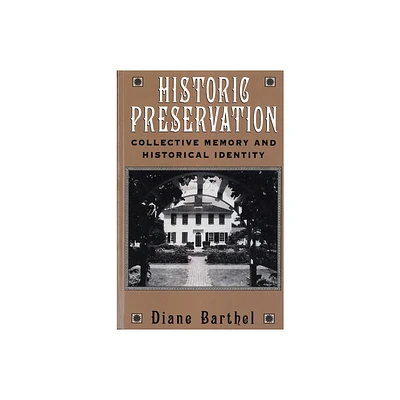Home
Historic Preservation: Caring for Our Expanding Legacy
Loading Inventory...
Barnes and Noble
Historic Preservation: Caring for Our Expanding Legacy
Current price: $109.99


Barnes and Noble
Historic Preservation: Caring for Our Expanding Legacy
Current price: $109.99
Loading Inventory...
Size: OS
*Product Information may vary - to confirm product availability, pricing, and additional information please contact Barnes and Noble
This well-illustrated book offers an up-to-date synthesis of the field of historic preservation, cast as a social campaign concerned with the condition, treatment and use of the legacy of existing properties in the United States. Drawing on a wide range of research, experience and scholarship over the last fifty years, it allows us to re-think past and current ideas in preservation, challenging readers to explore how their own interests lie within the cognitive framework of the activities taking place with people who care. “Who” is involved is explored first, in such a way as to explore “why”, before examining “what” is deemed important. After that the questions of “when” and “how” to proceed are given attention.
The major topics are introduced in an historical review through the mid-1980s, after which the broad intellectual basis and fundamental legal framework is provided. The economic shifts associated with major demographic changes are explored, in tandem with responses of the preservation community. A chapter is dedicated to the financial challenges and sources of revenue available in typical preservation projects, and another chapter focuses on the manner in which seeing, recording, and interpreting information provides the context for an appropriate vision for the future. In this regard, it is made clear that not all “green” design alternatives are preservation-sensitive. The advocacy battles during the last few decades provide a number of short stories of the ethical battles regarding below-ground and above ground historic resources, and the eighth chapter attempts to explain why religion has been long held at arm’s length in publicly-supported preservation efforts, when in fact, it holds more potential to regenerate existing sites than any governmental program.
The major topics are introduced in an historical review through the mid-1980s, after which the broad intellectual basis and fundamental legal framework is provided. The economic shifts associated with major demographic changes are explored, in tandem with responses of the preservation community. A chapter is dedicated to the financial challenges and sources of revenue available in typical preservation projects, and another chapter focuses on the manner in which seeing, recording, and interpreting information provides the context for an appropriate vision for the future. In this regard, it is made clear that not all “green” design alternatives are preservation-sensitive. The advocacy battles during the last few decades provide a number of short stories of the ethical battles regarding below-ground and above ground historic resources, and the eighth chapter attempts to explain why religion has been long held at arm’s length in publicly-supported preservation efforts, when in fact, it holds more potential to regenerate existing sites than any governmental program.


















